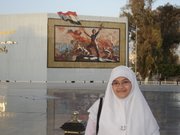
The Cairo Book Fair covers 80,000 square meters with some 1,400 stands of books and CDs [EPA]
Organisers of the Cairo Book Fair, the largest book exhibition of its kind in the Arab world, have said they expect some two million visitors on the fair's last day on Sunday.
Religious works have dominated the 39th annual Cairo Book Fair while literature and scientific texts have taken a back seat.
Millions of Cairenes have been thronging to the fair giving it an air of carnival on the vast exhibition grounds covering 80,000 square meters in northern Cairo with some 1,400 stands of books and CDs.
The fair easily dwarfs similar events held in Beirut, Abu Dhabi and Casablanca.
bodyVariable300="Htmlphcontrol2_lblError";
"It is a representation of the conservatism in society," said Adel Abdel Moneim, an Arabic language and literature lecturer, who has been coming to the fair for years, referring to the vast numbers of inexpensive religious books on offer. "Still for someone who likes to read or follow new publications, the book fair every year is a golden chance," he said. 'Guest of honour'
Following the example of the Frankfurt Bookfair, the Cairo event has designated a country as a "guest of honor", with Italy this year following up from Germany's emergence last year. The event has included literary salons held far from the restless crowds surging through the crumbling fair grounds including one featuring Claudio Magris and Antonio Tabucchi, Italian intellectuals and Alaa al-Aswani and Gamal Ghitani, Egyptian writers, discussing cross-cultural communication. "We still have a long road to travel, but there are encouraging signs of dialogue between the cultures and that can take place through more mutual translations," said Antonio Badini, the Italian ambassador to Cairo. "It is true that the number of publishers from outside the Arab world were rather few and we are trying to encourage them to come," said Nasser al-Ansari, the fair organiser and head of the country's largest publisher, the General Egyptian Book Organisation. Naguib Mahfouz
By far the most popular figure at this year's book fair was recently deceased author Naguib Mahfouz, Egypt's own Nobel winner, whose novels about families in Cairo's popular quarters introduced Egyptian literature to millions around the world. "I think that his [Mahfouz's] books will be the great success of this fair," al-Ansari said.
"Apart from the religious books of course." Of the 700 Egyptian and Arab publishers at the fair, the vast majority stock religious books on their shelves.
"Even we reserve about a quarter of our catalog for them," al-Ansari said. Television preachers
Korans of all styles, from the simple to the leather-bound, share shelf space with collections of religious sayings and fatwas as well as their more modern incarnations on cassettes and compact disks. The collected works of late venerable preachers like Egypt's Sheikh Mohammed Shaarawi and Saudi Arabia's Abdel Aziz bin Baz were present as well, though there was stiff competition from the young "new look" television preachers like Amr Khaled. "It's become a real business, but this fundamentalism comes from Saudi Arabia and stays with the cynical encouragement of the powers that be," said Alaa al-Aswani, a best-selling Egyptian author whose social satire the "Yacoubian Building" has achieved fame far beyond Egypt's borders.
Anti-Christian
The fair also has its darker sides, with anti-Christian polemics advocating conversion to Islam as the only solution to a flawed religion and of course plenty of editions of Adolf Hitler's "Mein Kampf" for sale. "It makes up a big part of our success, especially among the 18 to 25 crowd," said Mahmud Abdallah of the Syrian-Egyptian Dar al-Kitab al-Arabi publishing house. "Allowing the sale of books like 'Mein Kampf' is a total scandal," said Mohammed Arkoun, professor emeritus of Islamic history at the Sorbonne, for whom the Arab cultural production, at least as seen through the lens of the Cairo Book Fair, "reflects above all, a certain emptiness."
Censor
Partly this could be because certain books didn't make it to the fair. As Lebanese publisher Dar al-Adab discovered when the boxes containing works by Milan Kundera, Nikos Kazantzakis and noted Egyptian authors Nawal al-Saadawi and Edward al-Kharrat were missing. "We knew from previous experience that the censor had banned them," said Nabil Nofal, a member of the sales team, adding that they never receive official notification or explanation for why the books weren't allowed. According to literary observers, subject matters involving sex, controversial politics and attacks on religion set off alarms among the censors.

